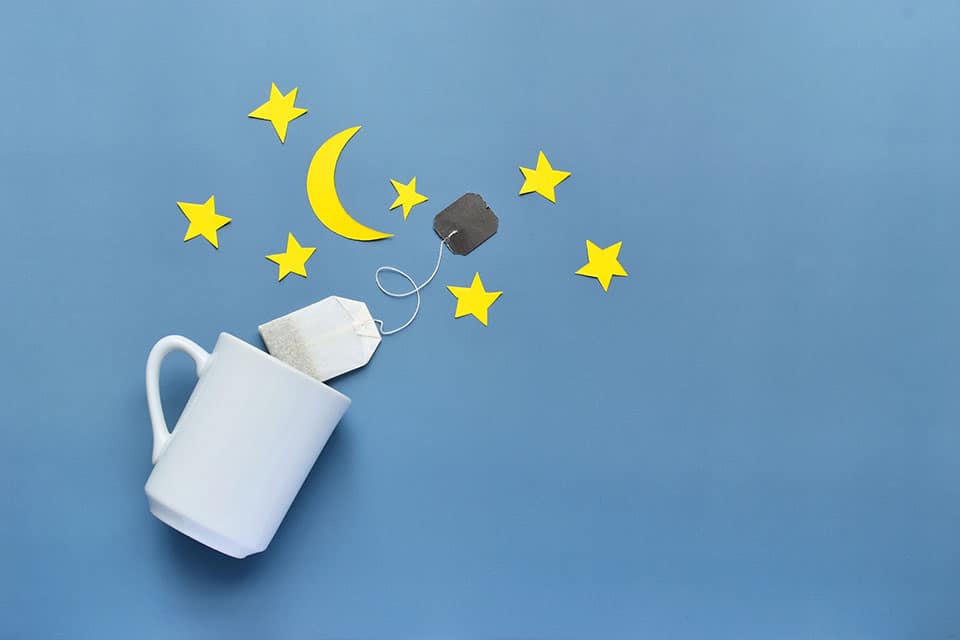Better Sleep Council spokeswoman Lissa Coffey shares the secrets to a restful night’s sleep through the soothing and comforting world of chamomile tea.
Chamomile Tea For Sleep
It’s late, and you’re tired of tossing and turning in bed, so what do you do? Many of us find ourselves wandering towards the kitchen, searching for a snack. Instead of reaching for a bag of potato chips or the ice cream in the freezer, try remembering what grandma advised you to do: make a cup of tea. Grandmothers everywhere have passed down recipes for tea concoctions that can help us settle into slumber, and what’s the one common thread in all these soothing brews? Chamomile.
Explore some of the benefits of chamomile tea and discover a few additional ingredients you might want to have on hand next time you’re trolling the pantry at midnight!

What is Chamomile Tea?
Traditional teas are made from the leaves of the tea bush, Camellia Sinensis, and conventionally contain caffeine. Herbal teas, on the other hand, are made from a combination of herbs, spices, or other plant materials. Chamomile tea, for example, is considered an herbal tea, not a “true tea,” because it comes from a plant with small daisy-like flowers.
You might already be familiar with chamomile, known for its healing properties and for its ability to aid in sleep. The sedative effect of chamomile tea comes from a flavonoid called apigenin, which creates a calming response in the brain, helping us feel sleepy and ready to crawl into bed.
Tea & Warm Milk
Warm milk has a long-time tradition as a sleep remedy, and for good reason. Milk and plant-based milks provide protein rich in an amino acid called tryptophan, which helps boost melatonin production.
When heated, milk helps raise internal body temperature, which can calm and relax us. The calcium in milk has a soothing effect on the nervous system. Plus, there’s the possible positive psychological effects—maybe because milk was a comfort food for us when we were babies.
Try it at home!
Dunk a bag of chamomile tea in your mug of warm milk. Sip your warm milky tea slowly while winding down for the night, preferably curled up on a cozy couch with a soft blanket wrapped around you!
Variations on Classic Chamomile Tea
If you prefer using tea bags, you can easily add a few different flavors to your cup or teapot. However, if you prefer loose tea, you can mix the flavors together and place them in an infuser.
To create your own personalized sleep brew, consider adding any combination of the following ingredients to your chamomile tea or warm milk:
- Turmeric, also known as Curcumin, is well known to help ease inflammation. Turmeric root is delicious with chamomile tea. Simply add a few thin slices to your cup for extra sleep benefits.
- Nutmeg is a powerful spice and has natural sedative qualities. Plus, its warm aroma pairs wonderfully with chamomile tea to enhance relaxation and improve sleep quality. However, nutmeg can be quite potent, so be sure to use it sparingly to avoid adverse effects.
- Valerian is a muscle relaxant and a strong sleep aid. Valerian root, on its own, tastes kind of earthy and is not very enjoyable to drink; blending it with chamomile or any of these other variations of ingredients makes it a lot more palatable.
- Ginger root is great for digestion and also has antiviral and antibiotic properties. If you can’t sleep because you have an upset stomach or a cold, a few slices of ginger is nice to add to your tea.
- Saffron, valued for its calming properties, promotes tranquility and aids in achieving a peaceful night’s rest, making it a great choice for enhancing your evening tea.
- Cinnamon is high in cinnamaldehyde, responsible for many of its health benefits. Cinnamon helps to lower blood sugar levels and fight infections. An easy way to get just the small amount you need and not overpower the other flavors is to stir your tea with a cinnamon stick.
- Honey contributes to the release of melatonin in the brain and gives a natural sweetness to the tea. Honey also supplies the liver with glycogen storage, giving it fuel to recover during rest so that it doesn’t have to produce stress hormones. This way, the body can rejuvenate more easily, helping us to sleep more soundly.
- Himalayan salt contains minerals such as magnesium, essential for relaxation and stress reduction. You just need a little bit. A pinch will do.
- Coconut oil is a healthy fat that helps in the production of sleep hormones. Half a teaspoon melts easily in the hot water of tea and helps herbs to assimilate into the body quickly.
Remember…
At the end of the day, there is no magical elixir or tea combination that can help you sleep if your mattress is in bad shape. A quality mattress is the foundation of a good night’s sleep. If you’ve had yours for longer than 5-7 years, check the mattress for lumps and bumps and signs of wear. It’s probably time to get a new one!
Cheers to a wonderful night’s sleep!



